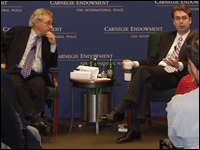Registration
You will receive an email confirming your registration.
IMGXYZ894IMGZYXSpeaking with journalist E.J. Dionne, Jr., about his book, J. Peter Scoblic discussed his journey writing about the impact of ideology on the Bush administration and its ability to combat nuclear terrorism. While working as the editor of Arms Control Today, the executive editor of The New Republic, and a visiting scholar with the Nonproliferation Program at the Carnegie Endowment, Scoblic followed and analyzed the Bush administration’s nuclear policy. Absent an understanding of the administration’s ideology and ideas, he said, it is difficult for one to understand where U.S. nuclear policy was headed after 9/11. The U.S. attacked Iraq under the assumption that it had concealed weapons of mass destruction, but ignored the far more advanced nuclear programs of North Korea and Iran. To better come to grips with these seeming contradictions, Scoblic decided to delve deep into the history of the modern conservative movement, tracing it back to the 1950s, to understand its birth and evolution to the present day.
It was during the early Cold War period "that conservatism came into being as a coherent ideological movement," Scoblic said, and it was the framing of U.S.-U.S.S.R. relations by conservatives as a "good versus evil, Manichaean struggle" that undercut U.S. security. Conservatives before World War II were marked by laissez-faire economic policies fractured by the Great Depression and conventional isolationist sentiment. Afterward, conservative ideas underwent an evolution centered on a view of communists as the ubiquitous enemy and which asserted that any sort of engagement with the Soviet Union was "appeasement." These emerging ideas were buoyed by conservative icon William F. Buckley, Jr., and National Review, founded in 1955, which acted as a forum for disseminating conservative thought.
The acrimonious Cold War debate over rolling back, containing, or appeasing the Soviet Union captured Scoblic's interest. Conservatives—led by Buckley and his colleague James Burnham—decried President Truman's containment strategy, calling it dangerous and immoral because it implied long-term coexistence with the Soviet Union. Instead, they wanted to roll back communism. According to Scoblic, this clash of ideologies came to a head during the Cuban Missile Crisis, which ultimately ended because President Kennedy negotiated with the Soviet Union to avoid nuclear war. Nevertheless, Barry Goldwater called Kennedy’s solution "appeasement," setting the stage for the debate over the "paradigm-shifting" ABM Treaty and the arms control agreements of the 1960s and 1970s, when conservatives undercut the Johnson and Nixon administrations' attempts to reduce tensions with the Soviet Union.
The Vietnam War only amplified the deep-seated divisions between liberals and conservatives. By the Carter years, liberals had "broken left," drifting away from Truman-style containment and speaking about the United States' "inordinate fear of communism," while conservatives attacked Carter over SALT II, Scoblic said. He added that the culmination of conservatism occurred in the first term of the Reagan administration, when the president characterized the Soviet Union as an "Evil Empire," but noted that even Reagan eventually retreated from his conservatism and signed an arms control treaty with Mikhail Gorbachev. Paradoxically, after accusing Reagan of appeasing Gorbachev, conservatives today have resurrected Reagan as their poster child. Reagan's nuclear abolitionism and his desire to make a deal helped peacefully end the Cold War, but Reagan's military buildup was not responsible for the downfall of the Soviet Union. "Communism itself had led to the Soviet collapse, not Reagan," Scoblic said.
Asked about the lessons of his book-writing venture, Scoblic said that he had concluded the U.S. cannot base its security policies on a conservative worldview. During the Cold War, he said, a Manichaean worldview almost led the U.S. to nuclear war. In the current era, "the U.S. cannot just attack preemptively. It needs to act cooperatively" to prevent the spread of nuclear material. With the world facing growing nuclear proliferation concerns after 9/11 and enemies not confined to good and evil nation-states, Scoblic said, the U.S. cannot confront international security challenges on its own.
